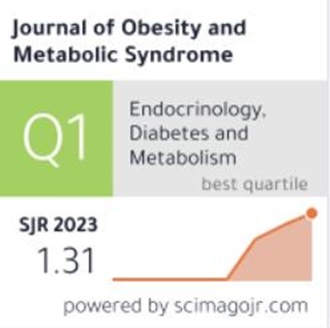Response: In Situ Mobilization of Patients with Obesity as a Key Determinant of Weight Loss Interventions (J Obes Metab Syndr 2020;29:292-302)
IF 4.7
Q1 ENDOCRINOLOGY & METABOLISM
引用次数: 0
Abstract
J Obes Metab Syndr 2022;31:88-90 While there is a growing body of evidence regarding the metabolic, physiological, or functional benefits of multi-disciplinary weight loss interventions in adolescents who are overweight and obese, their effects on mental health, well-being, health-related quality of life (HRQOL), and perceived physical-fitness and health remain less explored. Our research group recently tried to better understand these potential psycho-physiological responses to multi-disciplinary weight loss programs by considering different modalities of exercise interventions in obese adolescents.1 In particular, we recently reported in Journal of Obesity & Metabolic Syndrome, that a 4-month multi-disciplinary intervention incorporating high-intensity interval training improved HRQOL and perception of health and physical fitness in obese adolescents, and that most of these improvements were associated with degree of weight loss.2 In an Letter to the Editor, Choi3, while pointing out the quality and relevance of our work and its results, also stressed the necessity to fully consider the nature of the psychological support received by the adolescents, as well as the potential implication of their initial motivation when engaging in such interventions. We would like to thank Choi3 for raising these important points, giving us the opportunity to complete our initial publication, and to initiate what we believe are necessary discussions regarding the role and implications of adolescent (and overall patients) motivation and engagement in clinical interventions. First, the psychological intervention the adolescents received a monthly 90-minute session of psychological support through individual consultations with a professional. Sessions focused on selfesteem and emotional, social, and familial relationships and issues. As suggested by Choi3, psychological sessions can focus on motivation of patients to engage in the intervention efforts and to lose weight, which will impact their engagement with the program and affect the success of the intervention. However, our sessions mainly focused on coping with social and emotional difficulties that often accompany pediatric obesity. In his paper, Choi3 describes the importance of considering patient motivation, adherence, and engagement for intervention success. We agree and would like to take advantage of this opportunity to explore these concepts and clarify their potential implication for success of behavioral and clinical programs. Second, it seems important to clarify that our initial published反应:肥胖患者的原位动员是减肥干预的关键决定因素(J Obes Metab Syndr 2020;29:292-302)
虽然越来越多的证据表明,多学科减肥干预对超重和肥胖青少年的代谢、生理或功能有益,但它们对心理健康、福祉、健康相关生活质量(HRQOL)以及感知的身体健康和健康的影响仍未得到充分探讨。我们的研究小组最近试图通过考虑不同形式的运动干预肥胖青少年来更好地理解这些潜在的心理生理反应特别是,我们最近在《肥胖与代谢综合征杂志》上报道了一项为期4个月的多学科干预,包括高强度间歇训练,改善了肥胖青少年的HRQOL和对健康和身体素质的感知,并且这些改善大多与体重减轻的程度有关在给编辑的一封信中,Choi3在指出我们的工作及其结果的质量和相关性的同时,也强调有必要充分考虑青少年所接受的心理支持的性质,以及他们参与此类干预时最初动机的潜在含义。我们要感谢Choi3提出这些重要的观点,让我们有机会完成我们的初步发表,并启动我们认为必要的讨论,讨论青少年(和整体患者)动机和参与临床干预的作用和影响。首先,心理干预,青少年通过与专业人士的个别咨询,每月接受90分钟的心理支持。会议的重点是自尊、情感、社会和家庭关系和问题。正如Choi3所建议的,心理课程可以关注患者参与干预工作和减肥的动机,这将影响他们对计划的参与,并影响干预的成功。然而,我们的课程主要集中在应对经常伴随儿童肥胖的社交和情感困难。在他的论文中,Choi3描述了考虑患者动机、依从性和参与对干预成功的重要性。我们同意并希望利用这个机会来探索这些概念,并阐明它们对行为和临床项目成功的潜在影响。其次,似乎有必要澄清一下,我们最初发表的
本文章由计算机程序翻译,如有差异,请以英文原文为准。
求助全文
约1分钟内获得全文
求助全文
来源期刊

Journal of Obesity & Metabolic Syndrome
ENDOCRINOLOGY & METABOLISM-
CiteScore
8.30
自引率
9.60%
发文量
39
审稿时长
19 weeks
期刊介绍:
The journal was launched in 1992 and diverse studies on obesity have been published under the title of Journal of Korean Society for the Study of Obesity until 2004. Since 2017, volume 26, the title is now the Journal of Obesity & Metabolic Syndrome (pISSN 2508-6235, eISSN 2508-7576). The journal is published quarterly on March 30th, June 30th, September 30th and December 30th. The official title of the journal is now "Journal of Obesity & Metabolic Syndrome" and the abbreviated title is "J Obes Metab Syndr". Index words from medical subject headings (MeSH) list of Index Medicus are included in each article to facilitate article search. Some or all of the articles of this journal are included in the index of PubMed, PubMed Central, Scopus, Embase, DOAJ, Ebsco, KCI, KoreaMed, KoMCI, Science Central, Crossref Metadata Search, Google Scholar, and Emerging Sources Citation Index (ESCI).
 求助内容:
求助内容: 应助结果提醒方式:
应助结果提醒方式:


